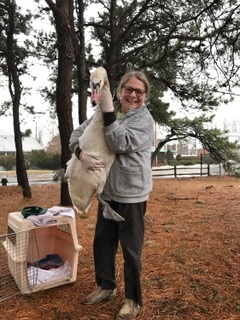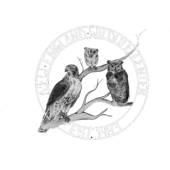
I have been in the unique position to be able to work in a capacity that combines both of my passions and my career choices. I am currently working at the Birdsey Cape Wildlife Center in Barnstable as a Veterinary Psychiatric Nurse Practitioner (VPNP). I received a Master’s Degree in Psychiatric Nursing from Boston College and became certified as a Psychiatric Nurse Practitioner in 1977. I worked in my private practice for almost 40 years. Additionally, along the way, I developed an intense interest in working with animals, particularly wildlife. I began to volunteer throughout Connecticut and Massachusetts, and made multiple trips to Belize working with orphaned and injured wildlife. In 2015 I began working at the Cape Wildlife Center in Barnstable as an animal caregiver volunteer. That led to a staff position once I retired from my private practice. I also became a Massachusetts Licensed and Federally Permitted Wildlife Rehabilitator. The more time I spent with the staff, volunteers, rescuers and animals I realized how stressful caring for wildlife could be and the impact it was having on the caregivers. Combining my skills led to my current position as a VPNP.
Compassion fatigue is a common occurrence among those working with animals, and is recognized as an occupational hazard. Compassion is described by the Dalai Lama as openness to the suffering of others, and noticing, feeling, and responding to it. During this Covid pandemic everyone has been working above capacity and are mentally tired and physically exhausted. Through communication and social support , a VPNP can help staff move toward resiliency and become more self -compassionate. Caregivers often need to be reminded how to care for themselves by taking more time off, taking breaks during their shift, and limiting the responsibility they take on. This is hard to do when you are working with wildlife because they don’t have any other advocates taking responsibility for them. From the rescuers to the veterinarians, everyone becomes invested in the welfare of these animals. Cases are especially difficult because most injured animals avoid capture because it is innate in them to not show any sign of weakness. By the time they arrive at our hospital, they are very sick or have severe injuries. This often leads to humane euthanasia which is difficult despite knowing that it is the best option.
Giving the staff the opportunity to talk about hard cases, difficult decisions and choices helps feelings to be dealt with rather than building up and becoming detrimental to their mental health. Dealing with the people who find and bring in injured and orphaned wildlife is another aspect of this position. Finding a squirrel hit by a car, or baby birds that have fallen out of the nest can lead to feelings of helplessness. A VPNP can help them talk about their anger, their frustration, and their sadness and listen to their tears. People become attached very quickly to wildlife they are trying to save, and it is heartbreaking to realize that they can’t all be saved. Many feel guilty wondering if they should have done more. Many also feel responsible when it is their pet that has injured or killed the wild animal, or when they try to care for it themselves, and make it sicker by feeding the wrong diet or giving it aspiration pneumonia. I spend time with these people on phone calls and in-person intakes helping them work through these feelings. It is important to not only acknowledge that they truly tried the best they could despite the results, but to also empower them by educating them to the right way to care for an injured animal they may find until it can be brought to us. Often times, once someone brings in an injured animal, they will call frequently for follow-up information hoping the animal is improving. One example is of a woman whose dog destroyed a cottontail’s nest and unearthed 6 babies. The woman brought in the 5 live infants and the dead one from the dog’s mouth. We talked frequently over the weeks the bunnies were at our center. She was having trouble dealing with the trauma of having to take the dead infant from the dog, the guilt of having her dog harm the bunnies, and the sadness over the death. Talking about it helped her cope with these emotions, and the successful outcome of the other 5 orphans helped her look at the total picture instead of just the traumatic incident. She also felt better equipped to handle the situation should it arise again, because of the information she learned in our discussions.
Sadness, anger and frustration are the most difficult emotions to deal with. The staff experiences these every day. Sadness is prevalent when animals are found in bad situations through nobody’s fault. Frustration happens when animals are hurt by people unintentionally. Anger occurs when animals are hurt intentionally. Unfortunately, this happens more than the public is aware of. For people who have dedicated their professional lives to helping animals, it is inconceivable that someone would hurt an animal on purpose. When birds come in shot from guns or arrows, or coyotes come in mangled from illegal traps or raptors come in dying from rat poison, this anger is fierce and deep. It’s important to work it out and re-focus on the positive actions we see from people who work to help animals. People who bring us animals also experience a lot of anger. They are angry because we cannot fix all the animals, or because they are not allowed to care for them or keep them as pets. Again, education and listening are helpful tools to diffuse these situations.
This position is just becoming more mainstream, and very few places have someone who is skilled in care for both animals and humans. New England Wildlife Centers are invested in having a VPNP so they can continue to not only provide the best veterinary care for wildlife but also take care of their staff and help the community through the difficult times they may experience when they encounter injured or orphaned wildlife.
To learn more about the Cape Wildlife Center or help in their mission, visit www.capewildlifecenter.com or call 508 362-0111.
Caryn Ritchie is a Veterinary Psychiatric Nurse Practitioner at the Cape Wildlife Center and holds both a Massachusetts wildlife rehabilitator’s license and a federal permit to rehabilitate migratory birds.

Recent Comments